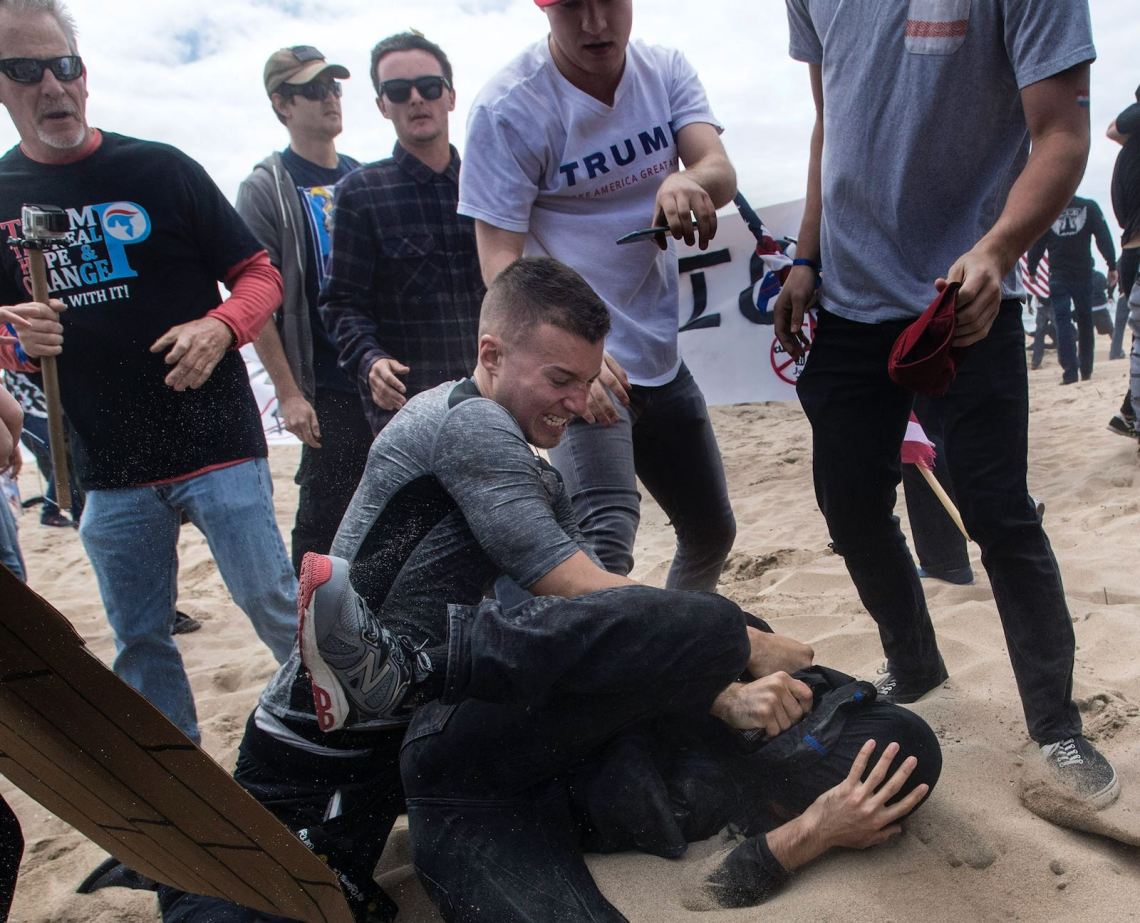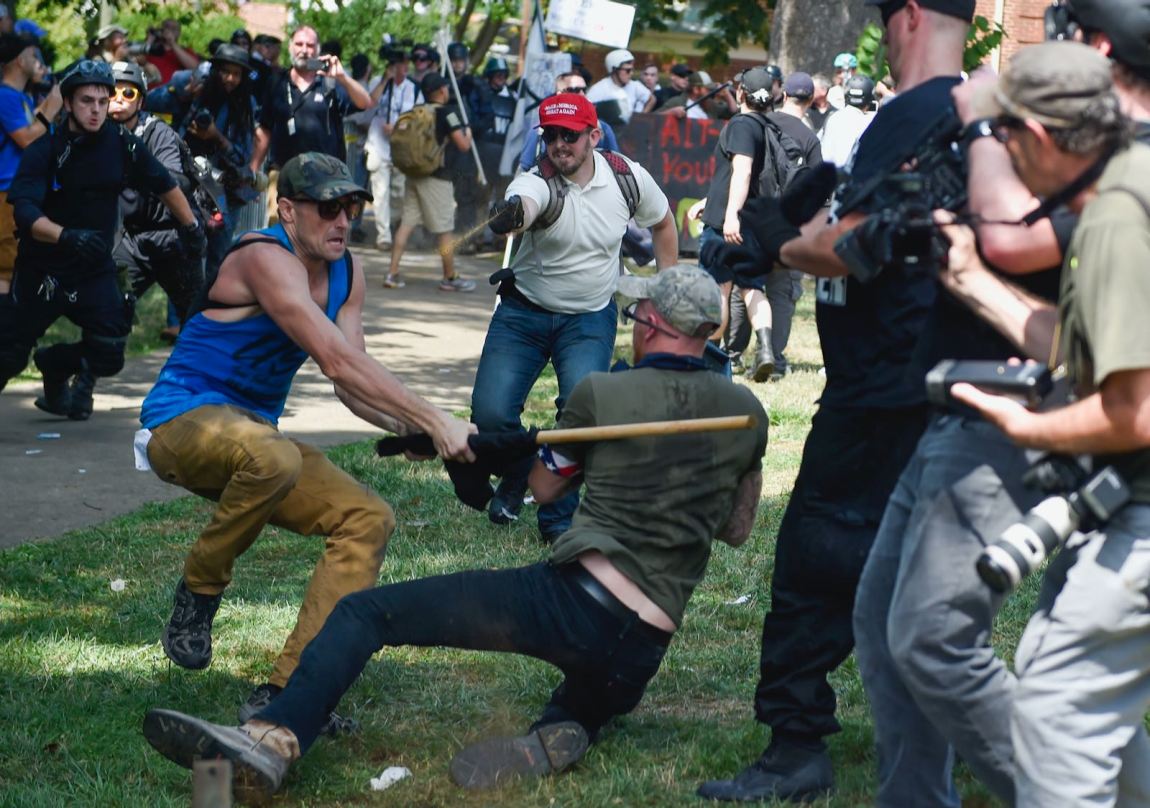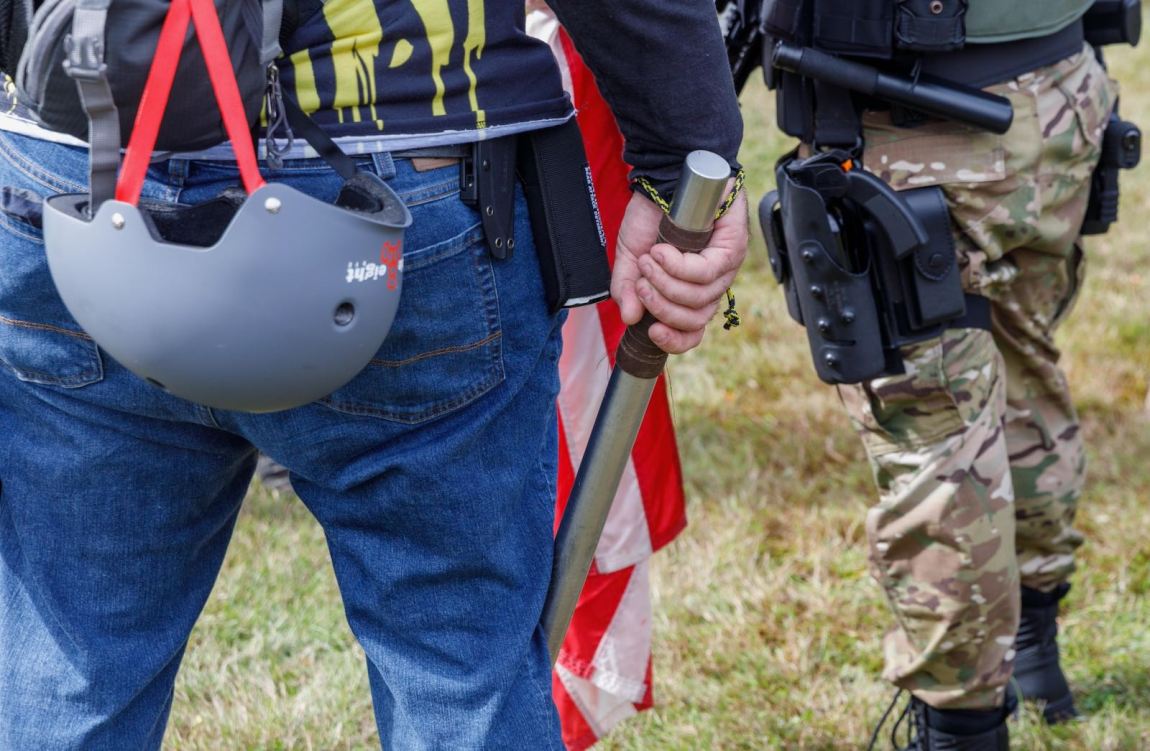As the threat of political violence looms over the 2020 presidential election, federal prosecutors in Los Angeles are preparing for an appeals hearing for the founder of a neofascist street gang at the heart of the earliest street violence of the Trump era. Four years ago, Robert Rundo, a thirty-year-old Queens native, construction worker, and ex-convict, cofounded a group named the Rise Above Movement (RAM). Ostensibly a mixed-martial-arts club for young white men in Southern California, the organization has also promoted identitarian, nativist politics, with a particular antipathy for antifascist activists who, at the time of RAM’s founding, were physically confronting far-right activists throughout California.
In 2019, a US District Court judge threw out Anti-Riot Act charges against Rundo and three other RAM members on grounds that the statute itself was over-broad and criminalized expressions of political opinion, even if they resulted in violence. It is these charges, originally brought because of their involvement in violence at protests in Orange County, San Bernardino, and Berkeley in 2017, that federal prosecutors are now seeking to reinstate at the hearing on November 17.
The Anti-Riot Act has been used to prosecute activists from both sides of the political spectrum, most notably in 1969 with the trial of the “Chicago Seven,” who were accused of conspiring to foment violence at the 1968 Democratic National Convention in Chicago. Last year, four other members of the Rise Above Movement pled guilty on anti-riot charges in Virginia for their part in the Charlottesville Unite the Right rally.
There have been other prosecutions of far-right groups on a variety of violent offenses, including the Proud Boys, Atomwaffen, and The Base, but no such case has risen as high in the federal court system as Rundo’s. The Rise Above Movement spearheaded political violence in California in 2017, well before such clashes went national. Until the group was broken up in 2019 by concerted law enforcement action, RAM was a figurehead of the alt-right, its street-fighting exploits the subject of numerous memes. It also built ties to violent right-wing extremist groups throughout Central and Eastern Europe, as well as forging connections in the US with old-line skinhead gangs like the Hammerskins and the Aryan Brotherhood.
Federal prosecutors’ renewed effort to convict RAM’s founder comes at a time when the FBI has issued an intelligence assessment that warns of the “violent extremist threat” around the election and its aftermath, and when a plot by anti-government militia members to kidnap the governor of Michigan was foiled by federal law enforcement agents. Whereas Rundo’s group once fought Antifa with taped fists, armed groups in battle fatigues and carrying military-type weapons are becoming a customary sight at right-wing counterdemonstrations against social justice protests. RAM itself had begun training with firearms and practicing drive-by style shootings before law enforcement descended on the group. This dangerous evolution is what makes Rundo’s career such an instructive case study of growing militancy among far-right violent extremists in the US.
*
Rundo returned to the United States for his hearing earlier in September after months of travel through Serbia, Ukraine, and Hungary. In some respects, this was an homage for Rundo: when he first formed RAM, he was consciously taking up the street-fighting tradition of European far-right groups like Italy’s CasaPound and Russia’s White Rex; and he has been back a number of times to rekindle the connections.
“The biggest influence was from White Rex,” Rundo said in a recent interview with a far-right podcast. He cited, in particular, the group’s founder, Denis Nikitin, a former member of soccer hooligan gangs for FC Köln and CSKA Moscow who hosts far-right MMA tournaments across Europe, sells neo-Nazi-themed clothing, and participated in the riots during a Euro 2016 soccer match between Russia and England.
Of RAM’s 2016 founding (the group was first called “DIY Division”), Rundo said, “The American scene at the time didn’t have this street activism that I saw that was very successful in Europe. It was something that I saw to me that was very appealing.” RAM’s appeal to alienated white American youth came through the potent mix of combat sports, graffiti, and street culture that mimicked European football hooligans as well as Southern California’s street gangs.
“I can’t remember what chapter it is in Mein Kampf,” he went on, turning to the subject of Adolf Hitler, “[where] he says we need more people that take up boxing than [we need] intellectuals.”
While staying in Rome in 2018, at a hostel and youth center that belongs to CasaPound (the name refers to the American poet and fascist sympathizer Ezra Pound), Rundo was surprised to see crowds of young Italians turning up for a rap concert. When he asked why CasaPound would be hosting a concert of non-white music, a member told Rundo that it was what was popular—better to adapt right-wing ideas to popular culture than risk falling into irrelevance.
Advertisement
Rundo also drew on the writings of fascist philosopher Julius Evola to conceive of the Rise Above Movement as a “meta-political” organization that would foster its own culture, making it independent of Western commercial culture, which Rundo believes is sapping the vitality of white Americans with mainstream TV, substance addiction, junk food, and multicultural values. Following Evola’s teaching, he believed, the right can provide wayward white youth with direction and purpose in life through political and physical education. This would equip its tough young cadres to “revolt against the modern world,” in words of Evola that RAM made its credo, and prepare them to confront ideological opponents.
“They did nothing with electoral politics, but they did everything with street politics and building a counterculture,” Rundo said of CasaPound. “Everything we can do that’s outside of the mainstream, outside of their poison, we need to do.”
What Rundo himself brought to this project was a degree of charisma that made him able to recruit others. As a young man, he was involved in the Original Flushing Crew, a multiracial neighborhood gang in Flushing, Queens. After a spell in state prison for the 2009 stabbing of an MS-13 gang member, Rundo formed a small whites-only gang inside called the 88ers (a name instantly recognizable to neo-Nazis as using the eighth letter of the alphabet to refer to “Heil Hitler”).
When he was initially outed after the Rise Above Movement was investigated by ProPublica in 2017 and a PBS Frontline documentary series the following year (I contributed reporting to both), Rundo’s civilian life as a unionized laborer in Southern California came apart. He lost his job, and his fiancée gave him an ultimatum—me or the movement—and then left him. His response was to dive deeper into right-wing militancy, and in the years since, his standing in the international far right has only grown. In an internal memo about far-right domestic terrorism that was circulated in March 2018, the FBI classified him as a “tier one operator.”
Since the group’s founding, RAM forged extensive ties to the older, criminal white skinhead gangs, notably the Western Hammerskins, the West Coast chapter of the largest skinhead umbrella group in the US. Reilly Devore, a prominent San Diego Hammerskin organizer, has appeared in several of RAM’s slickly produced propaganda videos that had been a feature of the group’s early renown. Matthew Branstetter, another Hammerskin from Orange County who did state prison time for a 2011 hate crime assault on a Jewish man, has also trained with RAM.
Rundo himself has also mixed with members of the Aryan Brotherhood at social gatherings. In the same recent podcast interview, he recounted how, while awaiting his 2019 court hearing, he’d been accepted by the skinheads who ruled the roost over white inmates at the Los Angeles County jail.
In fall 2018, after the indictments in Virginia of four of his comrades, Rundo went on the run from federal authorities, aiming to hide in Ukraine, which has become something of an asylum for right-wing militants who are or consider themselves to be fugitives from US justice. Because of travel restrictions placed on him by American authorities, Rundo was turned back to the US while attempting to transfer flights in London. Weeks later, he made a second attempt: he walked across the border into Mexico and made his way to El Salvador—only to be apprehended there and turned over to the FBI. He was flown back to Los Angeles, accompanied by FBI agents, to face prosecution on the now-overturned indictment. In early 2020, having regained his passport and travel privileges, Rundo did pay a visit to Ukraine, reconnecting with another former RAM member there and visiting RAM’s patrons in the Azov Battalion, an ultra-nationalist, far-right regiment in Ukraine’s National Guard.
Whereas RAM once hoisted banners at rallies declaring “Defend America,” Rundo now believes, as he told the podcast interviewer, that the country “is collapsing.” He has urged fellow right-wing “dissidents” to flee the United States and, if possible, obtain foreign passports in order to avoid travel restrictions like the No Fly list.
At the same time, his image has changed, from a SoCal-friendly, MMA gym-rat look to harder-edged, traditional skinhead iconography: he sports new tattoos—a Nazi-style Sonnenrad (“black sun”) tattoo on his right elbow, and on his abdomen, a dagger emblazoned with “Me Ne Frego” (“I don’t care”), motto of the Italian Blackshirts.
Following his release from federal custody, Rundo again immersed himself in far-right activism, connecting with an East Coast neofascist group named Revolt Through Tradition (another Evola reference) that also trains in mixed martial arts and posts propaganda videos that draw on RAM’s early work. Besides such efforts to establish himself as an inspirational YouTube personality of the far right, Rundo has proven adept at turning movement politics into a business model, lately hawking a line of extremist-themed clothing.
Advertisement
*
Court documents from Rundo’s federal appeals case, as well as hearings in the criminal case against RAM’s now-convicted cofounder, Ben Daley, make clear that federal law enforcement views RAM as an organization capable of political violence. According to a filing from prosecutors, Daley and Rundo organized training sessions whose purpose was to “prepare to engage in violence at political rallies, and then attended political rallies where they assaulted journalists, police officers, and others.”
The United States Attorney’s office in Los Angeles continued to keep tabs on Rundo after the 2019 dismissal of his indictment. A motion filed in the appeal, in March 2020, expressed prosecutor’s concern about his activities—and with reason: in February, he posted a video of himself attending a neofascist rally in Budapest to commemorate wartime Hungarian volunteers in Germany’s SS divisions.
It was in early 2017, when RAM was brawling its way through political rallies up and down California, that the FBI opened a domestic terrorism case focused on the group. Over the two years that followed, it is clear from prosecutorial records that RAM’s leaders were escalating their militancy from street fighting to potential armed operations.
During Daley’s sentencing hearing in July of last year, United States Attorney Thomas Cullen recounted remarks Daley had made following the Unite the Right rally in Charlottesville: that James Fields’s lethal car attack on counterprotesters was premature, and the movement needed to do more to prepare extreme tactics.
“The fact he was becoming more militant and potentially more dangerous is evidenced by the fact that these defendants are in the desert of California shooting assault rifles and driving a white van shooting out of it and practicing, essentially, a drive-by shooting,” Cullen said. “That’s disturbing evidence in and of itself, but in the context of the larger case, it gives you an idea of the road this group was heading on.”
When Daley was arrested by federal authorities in 2018, the FBI recovered a twelve-gauge shotgun, a loaded .357 pistol, and a knife with a Swastika insignia. Ammunition for assault weapons, smoke bombs, and flares were found in the home of another RAM member, Mike Miselis, a former Northrop Grumman systems engineer, who has since served just over a year in prison and is now out on supervised release.
The outcome of Rundo’s appeal hearing next month will prove decisive for his attempt to reestablish himself as a far-right figurehead through his Media 2 Rise project on Telegram and YouTube. There, he posts instructional videos on physical training, political organizing, and travel, all while promoting his personal narrative about the persecution of RAM by the federal government as “thought criminals.”
“It remains to be seen what Rundo does with all this Eastern European education…on how to be structured,” said a longtime investigator of white-power groups who was not authorized to speak on the record. In recent interviews, the investigator noted, it appears that Rundo’s approach to organizing has grown more sophisticated. “He’s maturing,” the investigator said, comparing Rundo now to Thomas Metzger, the former Klansman and founder of the group White Aryan Resistance, who is an ideologue revered by the Hammerskins and other skinhead groups.
The tardy but escalating federal law enforcement response to the growing militancy of the far right might seem welcome, but the renewed possibility that another central figure in the Rise Above Movement might serve prison time again is not necessarily reassuring. Just as occurred earlier in Rundo’s career, prison often leads to greater radicalization and the forging of tighter criminal–organizational bonds.
Rundo’s career also shows that a traditional law enforcement approach to dismantling right-wing extremist groups is a game of Whac-A-Mole. Actors like Rundo have ambitions far beyond those of the foot soldiers of traditional far-right street fighting; they have a long game of forging a lasting social movement, and are deft at using the tools of influencing and culture-warring.
Deradicalization is a much more complex task, one that will take years. The far right has firmly entrenched itself in Western youth subcultures, both online and off. Xenophobic, nativist ideas that were previously confined to fringe of American politics have been mainstreamed, from the Oval Office downward. And the “very fine people” whom President Trump first hailed after the mayhem of Charlottesville in 2017 are once again gearing up for confrontation.
Although concerted antifascist organizing has served to blunt the resurgence of far-right militants, often far outnumbering them at counter-demonstrations, groups like the Rise Above Movement and Proud Boys have seen their hate-violence validated by America’s commander-in-chief. Without a sweeping effort to address the root causes of radicalization, this evil genie will be very hard to get back in the bottle. The organized thuggery that plagues countries like Ukraine, Serbia, and Hungary, which Rundo and his movement seek to emulate, threatens to become a lasting feature of American society, too.





